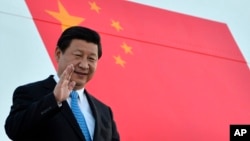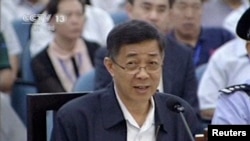BEIJING —
China stands at a crucial crossroads with a slowing economy and increasing calls for social and economic reforms. At top-level meetings beginning Saturday, Chinese President Xi Jinping and Premier Li Keqiang are expected to outline a road map for the country for the next 5 to 10 years.
For the past three decades, China's economic growth has lifted millions out of poverty and created a global power second only to the United States. But now as growth slows and social problems multiply, there is a growing consensus that China's long-successful economic model needs to change.
Analysts say China has relied too much on cheap labor, cheap exports and cheap resources such as coal to fuel its economic growth. Now, that strategy is under scrutiny as wages rise, the global economy continues to flounder and the Chinese public grows increasingly concerned about the environment and pollution.
Yang Jisheng (杨继绳), a prominent Chinese journalist, said expectations are high as China's leaders head into this weekend's high-profile summit to address these issues. But he said it is anyone's guess what kind of reforms the government will unveil.
“Continuing on with the old model is unsustainable and a new model is needed. But for more than a decade now, there has been talk about the need for a new model, but that has been impossible under the current system. So what we need now is even more reform,” he said.
Fresh start
Starting on Saturday and concluding on Tuesday, China’s leaders will hold what is called the Third Plenum - the third meeting in a five-year cycle of party leadership. On the table are issues such as banking and tax reform, land usage rights and the country’s household registration system among others.
The meeting is not always significant, analysts say, but there have been times when its role in helping the country move forward has been undeniable -- such as when former Chinese leader Deng Xiaoping launched China’s economic reform and opening up at the third plenum in 1978.
David Kelly (戴凯利) with China Policy in Beijing said the meeting is part paying homage to previous leaders and making a break with the past.
“[During the meeting] You might mouth some of their old rhetoric, you’ll hear social harmony, you’ll hear scientific mode of development because that was the previous lot," Kelly said. "And we’re all collegial, we’re all…this is the Communist Party, we don’t have elections because we don’t fight. Then things break into the cycle which are not cyclical and that’s what’s happening.”
One thing that has broken into China’s leadership cycle this time around is the political scandal of former Communist Party leader Bo Xilai.
Bo was sentenced to life in prison on charges of corruption, bribe taking and abuse of power. Kelly says the amount of corruption the scandal revealed at the highest ranks of the Communist Party is one reason why the meeting is so important.
“The other thing is the world financial crisis, which leaves China with a slowing growth rate, which it has to now really believe, even though it has mouthed this before, that it is real," Kelly said. "So, these things mean that, I would say that you cannot use the textbook, for what we know about the function of the third plenum, it is likely to have some extraordinary items.”
Deep waters of reform
What those items will be is unclear. On an almost daily basis China’s leaders have been playing up the upcoming meeting, talking about how they are ready to wade into the deep waters of reform and how the blueprint being sought at the meeting will be comprehensive.
Kelly believes one significant step would be the reform of China’s state-owned enterprises. These politically-connected businesses have long dominated large sectors of the economy. Analysts say some exercise greater influence than some government ministries. They are also a source of corruption an issue the new leadership has pledged to tackle, calling the campaign a life or death struggle for the Communist Party.
Some, such as former Xinhua reporter Yang Jisheng believe that China’s social challenges will continue to worsen until the government recognizes political reforms are just as important as economic reforms.
Political, economic discontent
Yang said that when Deng Xiaoping began China’s opening up and reform, political reforms lagged behind and in the end social inequality grew.
"The reason society became unfair is because the system of power that was established in the Mao Zedong era started to control the market in the post reform period. And the abuse of power and greed of capital created huge social problems,” Yang said.
Prominent economist Mao Yushi (茅于轼) agrees that political reforms are needed, but said such changes are doubtful.
Conflicing signals
He said Chinese President Xi Jinping's hearkening back to Mao Zedong has sent conflicting signals about his vision for reform.
“Everyone in the world knows the disastrous impact Mao Zedong had on China. And yet he [President Xi] is still using Mao’s methods to resolve issues. And because of that I don’t have any big hopes for the Third Plenum,” Mao said.
Xi has been cutting back on government excess and lavish banquets and cracking down hard on corruption. Mao Yushi said the crackdown has been a welcome highlight of the new leadership.
But the campaign, he argued has yet to really get going.
“The real root of this problem is the public’s ability to exercise oversight of the Communist Party. And recently the government has been tightening its controls of speech and oversight,” Mao said.
For the past three decades, China's economic growth has lifted millions out of poverty and created a global power second only to the United States. But now as growth slows and social problems multiply, there is a growing consensus that China's long-successful economic model needs to change.
Analysts say China has relied too much on cheap labor, cheap exports and cheap resources such as coal to fuel its economic growth. Now, that strategy is under scrutiny as wages rise, the global economy continues to flounder and the Chinese public grows increasingly concerned about the environment and pollution.
Yang Jisheng (杨继绳), a prominent Chinese journalist, said expectations are high as China's leaders head into this weekend's high-profile summit to address these issues. But he said it is anyone's guess what kind of reforms the government will unveil.
“Continuing on with the old model is unsustainable and a new model is needed. But for more than a decade now, there has been talk about the need for a new model, but that has been impossible under the current system. So what we need now is even more reform,” he said.
Fresh start
Starting on Saturday and concluding on Tuesday, China’s leaders will hold what is called the Third Plenum - the third meeting in a five-year cycle of party leadership. On the table are issues such as banking and tax reform, land usage rights and the country’s household registration system among others.
The meeting is not always significant, analysts say, but there have been times when its role in helping the country move forward has been undeniable -- such as when former Chinese leader Deng Xiaoping launched China’s economic reform and opening up at the third plenum in 1978.
David Kelly (戴凯利) with China Policy in Beijing said the meeting is part paying homage to previous leaders and making a break with the past.
“[During the meeting] You might mouth some of their old rhetoric, you’ll hear social harmony, you’ll hear scientific mode of development because that was the previous lot," Kelly said. "And we’re all collegial, we’re all…this is the Communist Party, we don’t have elections because we don’t fight. Then things break into the cycle which are not cyclical and that’s what’s happening.”
One thing that has broken into China’s leadership cycle this time around is the political scandal of former Communist Party leader Bo Xilai.
Bo was sentenced to life in prison on charges of corruption, bribe taking and abuse of power. Kelly says the amount of corruption the scandal revealed at the highest ranks of the Communist Party is one reason why the meeting is so important.
“The other thing is the world financial crisis, which leaves China with a slowing growth rate, which it has to now really believe, even though it has mouthed this before, that it is real," Kelly said. "So, these things mean that, I would say that you cannot use the textbook, for what we know about the function of the third plenum, it is likely to have some extraordinary items.”
Deep waters of reform
What those items will be is unclear. On an almost daily basis China’s leaders have been playing up the upcoming meeting, talking about how they are ready to wade into the deep waters of reform and how the blueprint being sought at the meeting will be comprehensive.
Kelly believes one significant step would be the reform of China’s state-owned enterprises. These politically-connected businesses have long dominated large sectors of the economy. Analysts say some exercise greater influence than some government ministries. They are also a source of corruption an issue the new leadership has pledged to tackle, calling the campaign a life or death struggle for the Communist Party.
Some, such as former Xinhua reporter Yang Jisheng believe that China’s social challenges will continue to worsen until the government recognizes political reforms are just as important as economic reforms.
Political, economic discontent
Yang said that when Deng Xiaoping began China’s opening up and reform, political reforms lagged behind and in the end social inequality grew.
"The reason society became unfair is because the system of power that was established in the Mao Zedong era started to control the market in the post reform period. And the abuse of power and greed of capital created huge social problems,” Yang said.
Prominent economist Mao Yushi (茅于轼) agrees that political reforms are needed, but said such changes are doubtful.
Conflicing signals
He said Chinese President Xi Jinping's hearkening back to Mao Zedong has sent conflicting signals about his vision for reform.
“Everyone in the world knows the disastrous impact Mao Zedong had on China. And yet he [President Xi] is still using Mao’s methods to resolve issues. And because of that I don’t have any big hopes for the Third Plenum,” Mao said.
Xi has been cutting back on government excess and lavish banquets and cracking down hard on corruption. Mao Yushi said the crackdown has been a welcome highlight of the new leadership.
But the campaign, he argued has yet to really get going.
“The real root of this problem is the public’s ability to exercise oversight of the Communist Party. And recently the government has been tightening its controls of speech and oversight,” Mao said.





